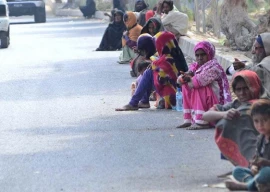
The gas strike came on the heels of another, more vigorous one: A five-week-long effort by young doctors, primarily from Punjab. Arguments have raged for and against their action, mainly concerning the tactics and ethics involved. The doctors’ demands — most of which were finally, grudgingly, met — are understandable. Young doctors are justified in demanding financial rewards commensurate with all the long years and hard work (and in many cases, money too) they put in. Also, as citizens and part of the country’s public workforce, they have every right to protest. The strike, however, purportedly left scores of patients dead (the exact figure can never be ascertained) and added considerably to the misery of public healthcare subscribers. Pun aside; the strike did have grave consequences.
I can’t imagine doctors being apathetic or oblivious to the ethics and seriousness of the issue. When I was an intern at a government teaching hospital, it was common for myself and my colleagues to put in up to 18 straight hours’ work, interrupted only by brief mealtimes and short, fitful naps on hard, often unmattressed beds adjacent to cubbyhole toilets that never quite worked. The measly monthly honorarium we got for our efforts (a mere Rs3,800 at the time, and some of my cohorts worked for free) seemed horribly unfair. Yet no one complained: We were there to learn, not earn. And there was no question of going on strike for such a thing.
The only strikes I remember were in response to violence against medicos and were token ones: One-day-long absences from work by doctors who weren’t on call. In other words, all essential staff was in place to cater for emergencies, ICUs and wards. Doctors are — or at least should be — trained to react instinctively and immediately to serious patients; it should be second nature. That’s what I remember most from my time as an intern. The act of wilfully denying emergency/intensive care services to patients, no matter what the pretext, is indefensible and verges on criminal callousness. A motto, inscribed on a wall of the hospital I used to toil in, said: The life we save may be yours. It was corny, soppy and subject to satirisation: The life we take may be yours, we used to quip jokingly. Young doctors in Punjab (and elsewhere) have been guilty of just that.
My trip to that coveted CNG station turned out to be a futile one; I’d raided it early to avoid endless, grit-and-fume-infested queues, but ended up in one anyway. And, much to the drivers’ disappointment — perhaps even the buffaloes’ — the gas was out of pressure. I wondered, as I do now, why every strike ends up hurting and harassing people who have nothing to do with the reason behind it. Recent strikes by doctors, mill owners and CNG proprietors have only added to the misery of ordinary people. We remain a truly stricken nation.
Published in The Express Tribune, April 23rd, 2011.


1729662874-0/One-Direction-(1)1729662874-0-165x106.webp)














COMMENTS
Comments are moderated and generally will be posted if they are on-topic and not abusive.
For more information, please see our Comments FAQ